American Indians in Galway, Ireland? November 17, 2012
Author: Beach Combing | in : Medieval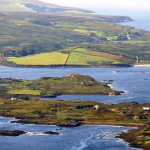
One of the most dramatic pieces of evidence for a pre-Columbian crossing of the Atlantic is to be found in a single Latin marginalia, that is some words scribbled into the margin of a book. The sentence in question appears in a copy of the Historia rerum ubique gestarum by Aeneas Sylvius Piccolomini which was […]
The First Sub-Saharan Africans in China? November 14, 2012
Author: Beach Combing | in : Medieval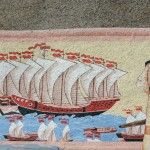
The following extraordinary passage appears in a twelfth-century Chinese text, by one Zhu Yu. The text is entitled Pingzhou Chats on Things Worthwhile – the Chinese have such a way with titles – and has several treasures. Consider though this passage and the wildmen. The wealthy in Guangzho maintain numerous foreign slaves. These slaves are […]
Bristol Discovers America November 11, 2012
Author: Beach Combing | in : Medieval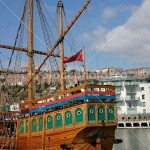
The most credible claims for pre-Columbian voyages across the Atlantic are those that took place in the generation immediately preceeding Columbus’ trip into the unknown. Take the text of a famous letter that was written in Spanish to an Admiral, almost certainly Columbus in late December 1497. The author is an English sailor, John Day. […]
The Tara Harpoon: Eskimoes in the Irish Sea? November 9, 2012
Author: Beach Combing | in : Contemporary, Medieval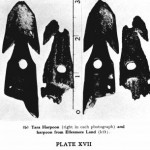
***Dedicated to SD*** Time for a wrong place artefact that has been all but forgotten: the Tara Eskimo Harpoon. An Eskimo Harpoon in Tara? what is ‘wrong’ with that? Well, Tara is in County Down in Northern Ireland and the TEH was found at Millin Bay there in 1927 and was brought along to a […]
Was Chess Invented in Ireland or China or India or…? November 5, 2012
Author: Beach Combing | in : Ancient, Medieval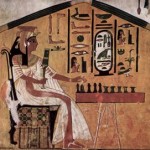
There is a general consensus that chess came out of the east, that it arrived in Europe through the Arab Mediterranean and that from there it made its way to the royal courts of France and Germany. Certainly, by the fifteenth century a game that we recognise […]
Newgrange and a Hundred Generations November 2, 2012
Author: Beach Combing | in : Ancient, Medieval, Prehistoric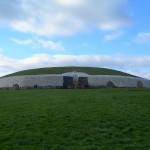
Newgrange, standing near the Boyne, is one of the great treasures of Ireland and, indeed, of Europe. Built some four thousand years ago by the first Gaels it is mysterious and, when the mist comes in, vaguely malevolent. It is also exclusive. Each year a tiny group of fortunate men, women and children – chosen […]
The Missing Autobiography of Mario Esposito October 28, 2012
Author: Beach Combing | in : Contemporary, Medieval
Mario Esposito (obit 1975) was a talented medievalist born to an Italian family in that glittering Dublin of Joyce, Yeats and Beckett. ME got involved with the struggle for Irish independence, was a keen mountaineer, but above all published on Irish manuscripts. His first academic article was written when he was 18, a rather misinformed […]
Fairy Jousting? October 26, 2012
Author: Beach Combing | in : Medieval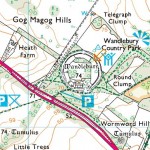
This tale comes from an early thirteenth-century Latin collection of mirabilia. It has not, to the best of Beach’s knowledge been associated with fairies, but reading it eight hundred years after its composition, there seem to be some fey hints worth flagging up. Note that the Latin below comes from an early edition where there […]
Flying with Diana October 23, 2012
Author: Beach Combing | in : Ancient, Medieval, Modern
One of the most fascinating questions about witchcraft belief is the extent to which it was invented by the Inquisition (and other bogey men of our own imaginations); or to what extent it reflected common beliefs held by medieval and early modern European populations. If we accept that the idea of the sabbat and devil-sex, […]
Indonesians in Medieval Africa October 22, 2012
Author: Beach Combing | in : Medieval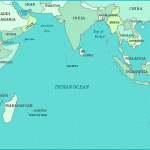
Despite all the excitement about the use of DNA in history, those elusive strands have so far proved surprisingly unhelpful in our text books. The problem is that populations with similar DNA live close to each other and that it is next to impossible to give a chronological breakdown of when a given locality changes […]
Immortal Meals #10: Love Feast in Fifteenth-century Florence October 20, 2012
Author: Beach Combing | in : Ancient, Medieval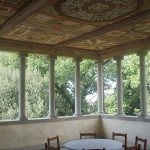
If you could visit any dinner in history, where the mighty of the earth were gathered, what would you choose? One of Nero’s shindigs in ancient Rome, Giordano Bruno’s Ash Wednesday Supper, the Banquet of the Chestnuts to watch the Borgias having sex, Churchill and Stalin‘s snarl show at Tehran, Mannerheim blowing cigar smoke into […]
Out of Place Artefacts: Eyebrow-Raisers and Eye-Poppers October 14, 2012
Author: Beach Combing | in : Ancient, Medieval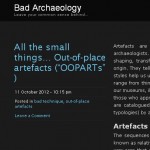
***Dedicated to Amanda and BFM*** Bad Archaeology, a necessarily quarrelsome but very worthwhile corner of the internet, is presently hosting an article on Out of Place Artefacts: objects that have turned up in places or in times where they would not be expected. As readers of Strange History will know the present author has frequently […]
How Big Are Fairies? October 12, 2012
Author: Beach Combing | in : Medieval
There is a lot of confusion about the size of fairies in tradition and we often read that ‘small’ fairies were the invention of Shakespeare and his hangers on. The proof that small fairies were there all along comes, instead, in Gervase of Tilbury’s Otia Imperialia written and ‘published’ in the early thirteenth century: long […]
Roman Empire vs Caliphate in Sub-Saharan Africa October 7, 2012
Author: Beach Combing | in : Ancient, Medieval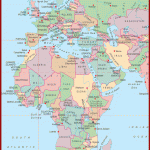
By the mid first century AD the Roman Empire had run against four limits, limits that its subjects would never overcome: in the west, the Atlantic; in the north, the German tribes (thanks Varus); in the east, the ‘Persian’ Empire and its successors; and in the south, the Atlas Mountains and the Sahara Desert beyond. […]
A Phantom Inventor: Flavio Gioia October 5, 2012
Author: Beach Combing | in : Medieval, Modern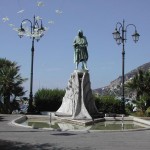
Who invented the compass? The Chinese, of course. Sometime between 800 and 1000 that people began to use their lodestones to navigate at sea. But the compass also appears in Europe in the eleventh or twelfth centuries and do we have a case of borrowing (from the far orient, as with playing cards) or independent […]


